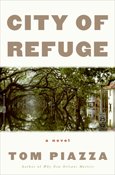Hurricane Katrina made landfall in southern Louisiana and Mississippi Aug. 29, 2005. The subsequent flooding of New Orleans was a tragedy on a scale that is still unimaginable in modern America. For most of us watching on television and reading the news, there was a sense of overwhelming disbelief that this could happen in our country. But eventually our anger dissipated, our collective attention turned elsewhere, and we moved on.
Tom Piazza's novel "City of Refuge" (HarperCollins, 2008, $24.95) drags us back into that urgency and outrage. The author forces an uncomfortable intimacy as he introduces the reader to characters, families and a city that we have, in effect, abandoned.
Beginning a few days before the storm, and continuing through Mardi Gras the following spring, the story revolves around two male protagonists and their families: SJ Williams, an African American carpenter, and Craig Donaldson, a middle-aged white transplant from the Midwest.
Each family has its own problems before Katrina enters the picture. SJ's nephew Wesley is on the brink of being consumed by the violent and dangerous street life that his mother, Lucy (SJ's older sister, an unreliable but oddly sympathetic alcoholic), has succumbed to off and on for years. Meanwhile, Craig is in a marital funk, arguing constantly with his wife Alice.
The crux of the Donaldsons' larger conflict is embodied hilariously in the opening chapters, when their daughter Annie is called into the office at school.
"Craig, is it too much to ask that my seven-year-old daughter grow up without calling people 'm*ther f*ckers' and dancing like a hooker?" Alice asks.
Piazza skillfully lays out these family conflicts in the days leading up to the hurricane, and then steps back to let Katrina reorient his characters' priorities.
Accounts of the characters' forced migrations all across the country, appalling and tinged at times with dark humor, are a particularly fascinating part of the story. Watching Lucy settle in at a Bible camp in Missouri is another of the surprisingly funny moments in the book. It is made tender by the fact that the reader knows that Wesley is stranded in upstate New York with Art and Ell Myers, an elderly, retired white couple who volunteered their home to combat the helplessness of watching the news that week. Sitting down to his first meal since the storm, Ell notes: "The longest string of words (Wesley) put together was, 'Do you have any like Crystal sauce or anything to put on this?Ҕ In the meantime, SJ is in Houston, after days of pulling bodies from the water. Reading about the trauma inflicted on these three fictional family members is painful; considering this was the reality for thousands of families is impossible.
Piazza's characters may occasionally border on stereotype, to illustrate the author's probable motives. It is clear that he has set out to both defend and redeem a city whose future remains precarious three years after Katrina, a city that in many ways has become the author's own raison d'etre. In fact, the author himself could be seen as a character that southerners have grown accustomed to: a middle-aged, white man who makes a living loving the history, music, food and customs of this corner of the country.
Reading his description of Craig's office, a signed photograph of Fats Domino and a snapshot of Dr. John on the wall, it is not difficult to picture Piazza surrounded by the same lovingly preserved memorabilia. So while his eagerness to convince the reader "Why New Orleans Matters" (the title of his non-fiction essay that came out five months after Katrina) occasionally interferes with the narrative's credibility, the fact that he knows and loves his subjects well ultimately redeems the story.
On its own merits as a work of fiction, "City of Refuge" is richly detailed, delicately woven and compulsively readable. Piazza's ability to move the story along at a good clip even as the reader knows what is coming is particularly impressive. It is disturbing to enter scenes known too well from the distance of news coverage from an entirely different (and uncomfortably close) angle: It is repulsive, yet you cannot look away.
In the larger context of the emerging post-Katrina diaspora, the novel serves as an effective plea to appreciate and preserve a city and its way of life. Piazza forces us to face the truly confounding scope of this disaster. It is clearly the author's hope that putting his audience face-to-face with these neglected individuals and families will both inspire empathy and prevent tragedy in the future. Let's hope that this is possible outside the realm of fiction.



Comments
Use the comment form below to begin a discussion about this content.